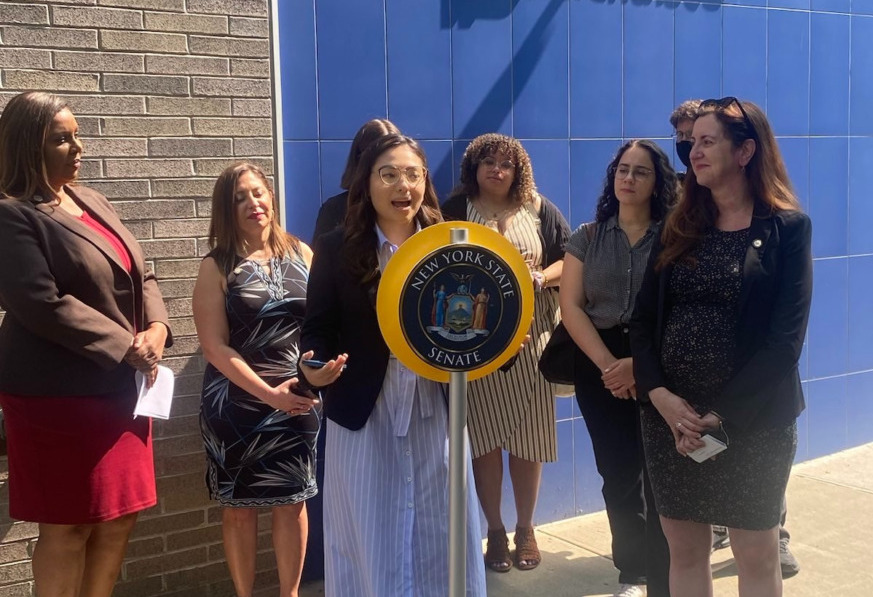
State Senator Kristen Gonzalez and Assemblywoman Nily Rozic detail key provisions in their legislation to provide abortion privacy protections that were included in the state budget. (Courtesy of Gonzalez’s office)
May 11, 2023 By Bill Parry
It has been nearly a year since Roe v. Wade was overturned by the U.S. Supreme Court and states around the country began implementing laws to criminalize people for their reproductive health care choices. Since then, New York has taken steps to protect reproductive freedoms, but vulnerabilities persist in the effort to protect the privacy of those who seek abortions across the state.
On Thursday, May 11, state Senator Kristen Gonzalez and Assemblywoman Nily Rozic were joined by Attorney General Letitia James and advocacy groups in front of Planned Parenthood in Long Island City to celebrate the inclusion of their proposal, HMH Part U, in this year’s final budget.
“I am thrilled that the final budget included Assembly member Rozic’s and my proposal to protect abortion access and safeguard our health care privacy,” Gonzalez said. “Someone coming to New York to receive needed reproductive health care should never have to worry that their information will be used to criminalize them in their home state. This legislation provides critical privacy protections so that everyone can access the abortion care that they need without the fear that their information will be used against them.”
Key provisions in HMH Part U protect abortion access and safeguard healthcare privacy by prohibiting electronic communications companies from cooperating with out-of-state warrants related to reproductive health care in New York when cooperating would reveal the identity and activities of a client; prohibiting geofencing around health care facilities for the purpose of advertising; building a consumer profile or inferring medical treatment of a person located at that facility; and prohibiting law enforcement from purchasing or obtaining electronic health information without a warrant.
“As a young woman, reproductive health care is my health care. And like tens of millions of Americans, I’ve used apps to help manage my reproductive health,” Rozic said. “It’s unconscionable that information could be sold to the highest bidder or weaponized against us. Everyone should have the ability to access the abortion care they need without additional fear or concern about the protection of their personal reproductive health data.”
Many New Yorkers are unaware of the sheer volume of information being collected regarding their healthcare choices. For example, phone apps track and store user’s personal health data, and without strong protections, that data is at risk. Third parties buy and sell consumer health data which poses a particular threat to individuals coming from out-of-state to exercise their right to an abortion.
“With ever increasing efforts to strip away abortion protections and bodily autonomy, it is vital that New York state step up to protect these basic rights. As attorney general, I have worked to safeguard abortion access, ensured companies provide accurate information and access to safe and legal medications to New Yorkers, and have fought back against efforts in other states to rollback Americans’ rights.,” James said. “The actions we take in New York will serve as a shield for millions of Americans, and will hopefully inspire other states to step up and fight back against efforts to ban abortion and violate individuals’ privacy.”
By prohibiting electronic communication companies and apps from complying with out-of-state warrants related to accessing legal reproductive health care in-state, New York has strengthened the privacy protections of those coming here for their reproductive health care needs.
“While Republicans in state legislatures across the country are using every tool in their tool kits to restrict access to abortion care and strip away our reproductive rights, New York is protecting access instead,” Assemblywoman Jessica González-Rojas said. “I’m proud that our final budget contained three bills that will collectively safeguard healthcare privacy for patients and providers and protect people who come to New York to seek abortion care from out-of-state criminalization.”
Additionally, this budget bill bans all law enforcement from obtaining electronic health data without a warrant. This provision in HMH Part U is a first-in-nation limitation on law enforcement’s ability to purchase data and helps align New York’s laws with the spirit of the Fourth Amendment.
“When someone comes to New York seeking out reproductive care, there shouldn’t be any doubt that their information will remain private,” Congresswoman Nydia Velázquez said. “With the inclusion of this provision in the final budget, we will be safeguarding abortion access in our state and ensuring that every patient has privacy protections.”
Geofencing, which is when a virtual boundary is established around a geographic location, is often seen as a harmless way to advertise to consumers. In the case of those seeking reproductive health care, geofencing can be a significant intrusion into privacy including by sending them pro-life messages. Apps using geofences can sell the information they have obtained to law enforcement or to third-party companies, which can then be legally purchased by anyone.
Anti-abortion groups have already used geofencing on smartphone users to identify abortion patients. Because this geofencing provision extends to all health care facilities in the state, all New Yorkers will receive increased medical privacy protections.
“Our reproductive health care decisions are for ourselves and our health care providers to know. Infringing on and sharing private patient data and information is a deep affront to our bodily autonomy and safety,” Planned Parenthood of Greater New York President and CEO Wendy Stark said. “We applaud the inclusion of this important measure in the state budget, and all efforts to protect patients’ reproductive health data. Today, we are one step closer to ensuring that New York is the abortion haven our communities deserve.”
